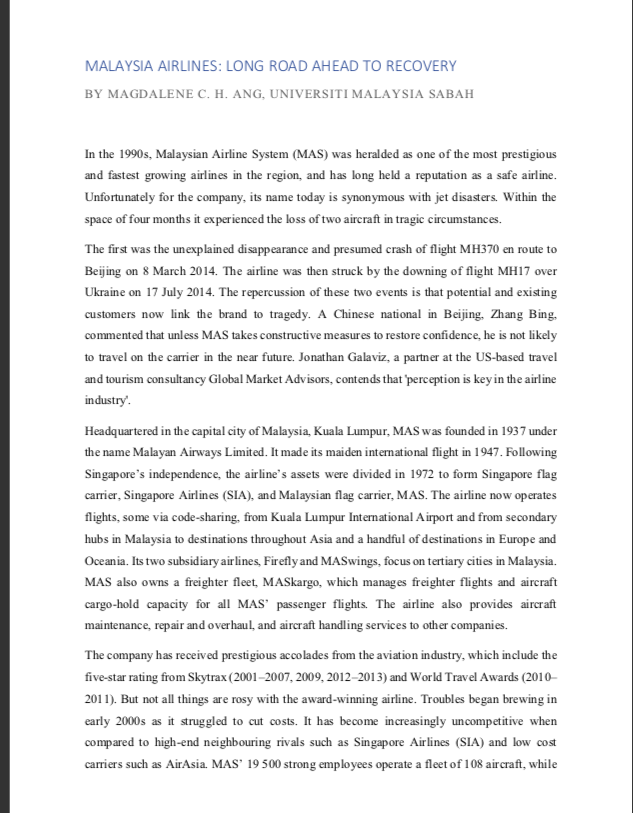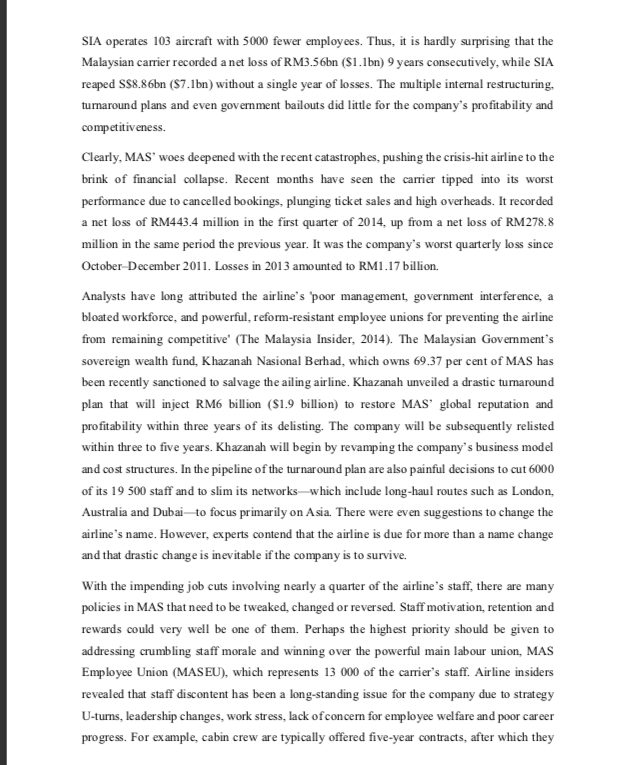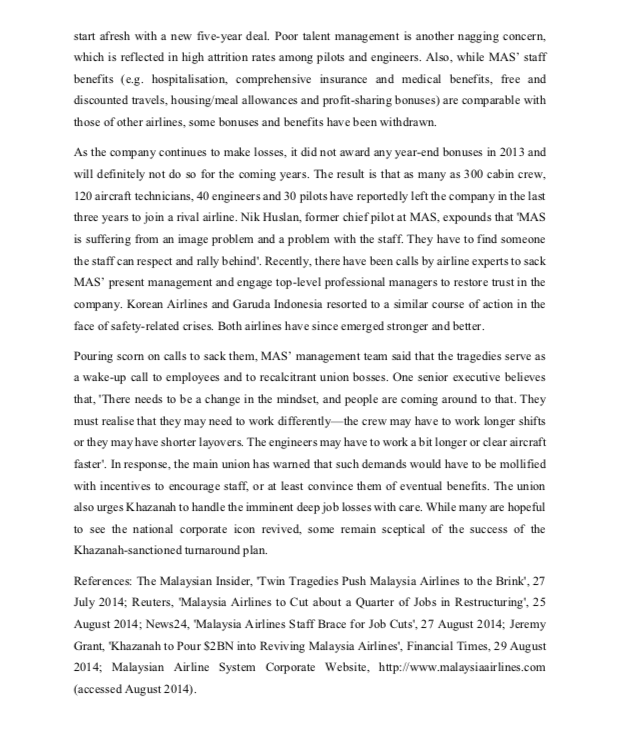Explain the concepts and theories on the problems with this industry based on organisational behaviours. Please apply theories and concepts.
MALAYSIA AIRLINES: LONG ROAD AHEAD TO RECOVERY BY MAGDALENE C. H. ANG, UNIVERSITI MALAYSIA SABAH In the 1990s, Malaysian Airline System (MAS) was heralded as one of the most prestigious and fastest growing airlines in the region, and has long held a reputation as a safe airline. Unfortunately for the company, its name today is synonymous with jet disasters. Within the space of four months it experienced the loss of two aircraft in tragic circumstances. The first was the unexplained disappearance and presumed crash of flight MH370 en route to Beijing on 8 March 2014. The airline was then struck by the downing of flight MH17 over Ukraine on 17 July 2014. The repercussion of these two events is that potential and existing customers now link the brand to tragedy. A Chinese national in Beijing, Zhang Bing. commented that unless MAS takes constructive measures to restore confidence, he is not likely to travel on the carrier in the near future. Jonathan Galaviz, a partner at the US-based travel and tourism consultancy Global Market Advisors, contends that 'perception is key in the airline industry'. Headquartered in the capital city of Malaysia, Kuala Lumpur, MAS was founded in 1937 under the name Malayan Airways Limited. It made its maiden international flight in 1947. Following Singapore's independence, the airline's assets were divided in 1972 to form Singapore flag carrier, Singapore Airlines (SIA), and Malaysian flag carrier, MAS. The airline now operates flights, some via code-sharing, from Kuala Lumpur International Airport and from secondary hubs in Malaysia to destinations throughout Asia and a handful of destinations in Europe and Oceania. Its two subsidiary airlines, Firefly and MASwings, focus on tertiary cities in Malaysia. MAS also owns a freighter fleet, MASkargo, which manages freighter flights and aircraft cargo-hold capacity for all MAS' passenger flights. The airline also provides aircraft maintenance, repair and overhaul, and aircraft handling services to other companies. The company has received prestigious accolades from the aviation industry, which include the five-star rating from Skytrax (2001-2007, 2009, 2012-2013) and World Travel Awards (2010- 201 1). But not all things are rosy with the award-winning airline. Troubles began brewing in early 2000s as it struggled to cut costs. It has become increasingly uncompetitive when compared to high-end neighbouring rivals such as Singapore Airlines (SIA) and low cost carriers such as AirAsia. MAS' 19 500 strong employees operate a fleet of 108 aircraft, whileSIA operates 103 aircraft with 5000 fewer employees. Thus, it is hardly surprising that the Malaysian carrier recorded a net loss of RM3.56bn ($1. Ibn) 9 years consecutively, while SIA reaped S$8.86bn ($7.Ibn) without a single year of losses. The multiple internal restructuring. turnaround plans and even government bailouts did little for the company's profitability and competitiveness. Clearly, MAS' woes deepened with the recent catastrophes, pushing the crisis-hit airline to the brink of financial collapse. Recent months have seen the carrier tipped into its worst performance due to cancelled bookings, plunging ticket sales and high overheads. It recorded a net loss of RM443.4 million in the first quarter of 2014, up from a net loss of RM278.8 million in the same period the previous year. It was the company's worst quarterly loss since October December 2011. Losses in 2013 amounted to RM1.17 billion. Analysts have long attributed the airline's 'poor management, government interference, a bloated workforce, and powerful, reform-resistant employee unions for preventing the airline from remaining competitive' (The Malaysia Insider, 2014). The Malaysian Government's sovereign wealth fund, Khazanah Nasional Berhad, which owns 69.37 per cent of MAS has been recently sanctioned to salvage the ailing airline. Khazanah unveiled a drastic turnaround plan that will inject RM6 billion ($1.9 billion) to restore MAS' global reputation and profitability within three years of its delisting. The company will be subsequently relisted within three to five years. Khazanah will begin by revamping the company's business model and cost structures. In the pipeline of the turnaround plan are also painful decisions to cut 6000 of its 19 500 staff and to slim its networks-which include long-haul routes such as London, Australia and Dubai-to focus primarily on Asia. There were even suggestions to change the airline's name. However, experts contend that the airline is due for more than a name change and that drastic change is inevitable if the company is to survive. With the impending job cuts involving nearly a quarter of the airline's staff, there are many policies in MAS that need to be tweaked, changed or reversed. Staff motivation, retention and rewards could very well be one of them. Perhaps the highest priority should be given to addressing crumbling staff morale and winning over the powerful main labour union, MAS Employee Union (MASEU), which represents 13 000 of the carrier's staff. Airline insiders revealed that staff discontent has been a long-standing issue for the company due to strategy U-turns, leadership changes, work stress, lack of concern for employee welfare and poor career progress. For example, cabin crew are typically offered five-year contracts, after which theystart afresh with a new five-year deal. Poor talent management is another nagging concern, which is reflected in high attrition rates among pilots and engineers. Also, while MAS' staff benefits (e.g. hospitalisation, comprehensive insurance and medical benefits, free and discounted travels, housing/meal allowances and profit-sharing bonuses) are comparable with those of other airlines, some bonuses and benefits have been with drawn. As the company continues to make losses, it did not award any year-end bonuses in 2013 and will definitely not do so for the coming years. The result is that as many as 300 cabin crew, 120 aircraft technicians, 40 engineers and 30 pilots have reportedly left the company in the last three years to join a rival airline. Nik Huslan, former chief pilot at MAS, expounds that "MAS is suffering from an image problem and a problem with the staff. They have to find someone the staff can respect and rally behind'. Recently, there have been calls by airline experts to sack MAS' present management and engage top-level professional managers to restore trust in the company. Korean Airlines and Garuda Indonesia resorted to a similar course of action in the face of safety-related crises. Both airlines have since emerged stronger and better. Pouring scorn on calls to sack them, MAS' management team said that the tragedies serve as a wake-up call to employees and to recalcitrant union bosses. One senior executive believes that, "There needs to be a change in the mindset, and people are coming around to that. They must realise that they may need to work differently-the crew may have to work longer shifts or they may have shorter layovers. The engineers may have to work a bit longer or clear aircraft faster'. In response, the main union has warned that such demands would have to be mollified with incentives to encourage staff, or at least convince them of eventual benefits. The union also urges Khazanah to handle the imminent deep job losses with care. While many are hopeful to see the national corporate icon revived, some remain sceptical of the success of the Khazanah-sanctioned turnaround plan. References: The Malaysian Insider, "Twin Tragedies Push Malaysia Airlines to the Brink', 27 July 2014; Reuters, "Malaysia Airlines to Cut about a Quarter of Jobs in Restructuring', 25 August 2014; News24, 'Malaysia Airlines Staff Brace for Job Cuts', 27 August 2014; Jeremy Grant, Khazanah to Pour $2BN into Reviving Malaysia Airlines', Financial Times, 29 August 2014: Malaysian Airline System Corporate Website, http:/www.malaysiaairlines.com (accessed August 2014)









